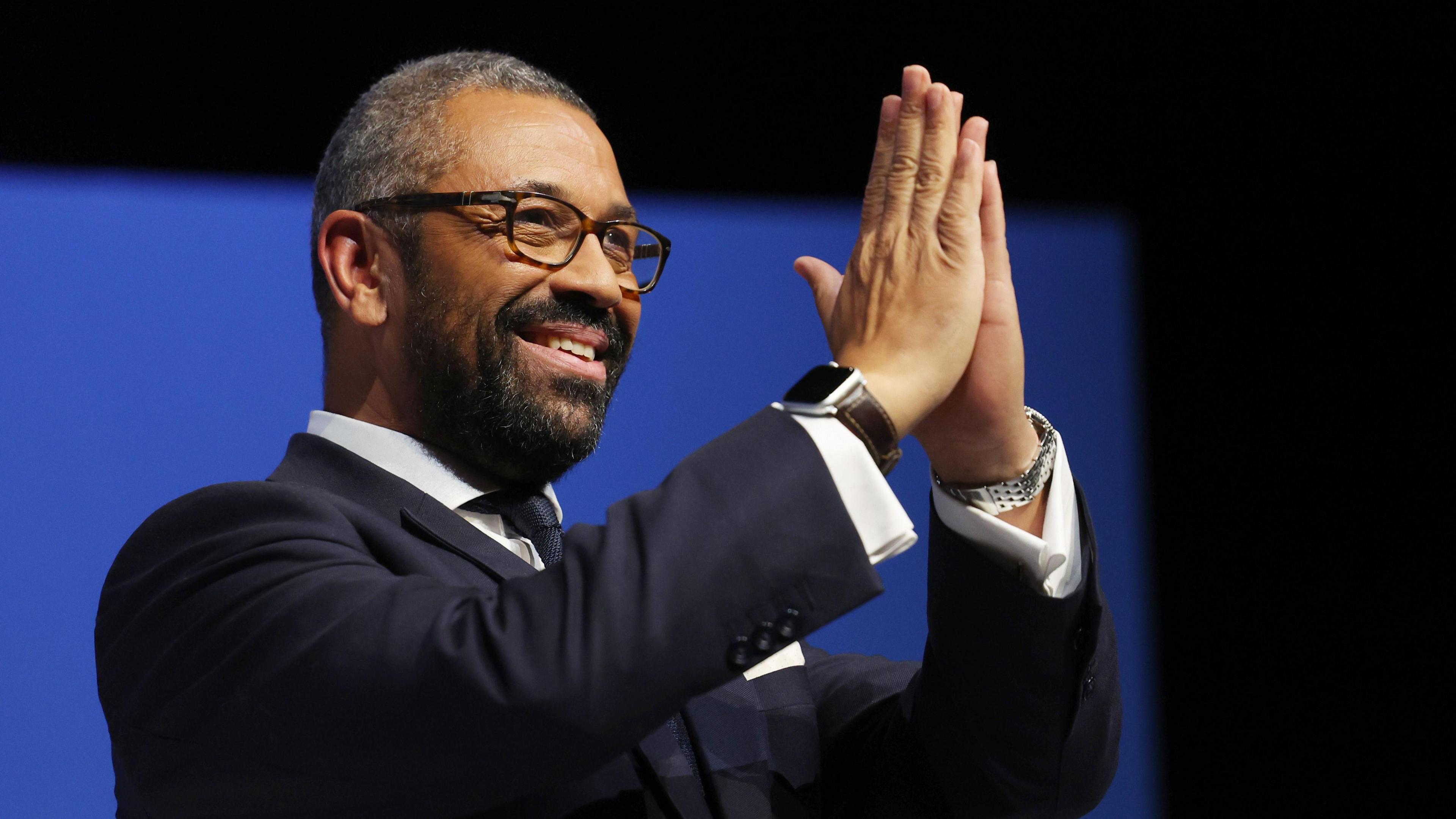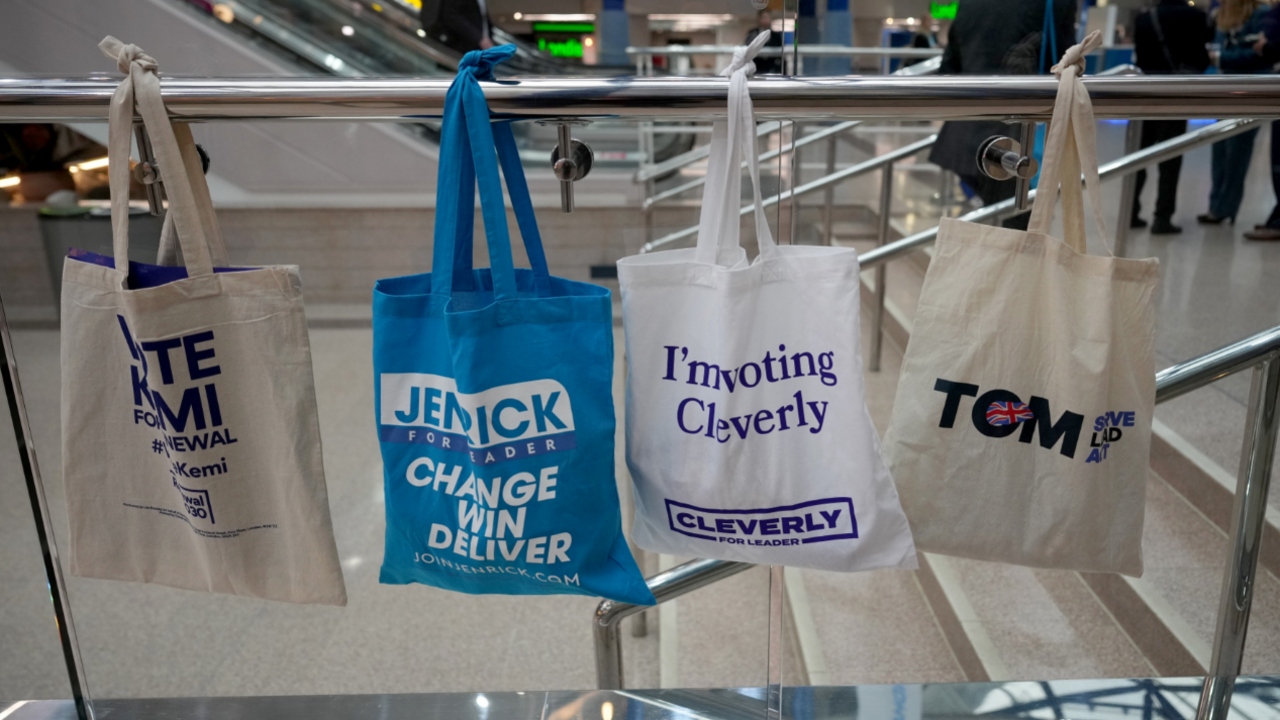Cleverly makes his mark - but will it be enough?

- Published
It felt like James Cleverly made the most of his moment today.
The two frontrunners in this leadership race, Kemi Badenoch and Robert Jenrick, have each had difficult days at this conference.
On Sunday, Kemi Badenoch got herself in a mess about maternity pay.
On Tuesday, Robert Jenrick provoked rage among some – including his rival and former soldier Tom Tugendhat – with his remarks about UK special forces and human rights laws.
Conservative leadership hopefuls vow change to win again
- Published2 October 2024
Tories search for answers after election drubbing
- Published2 October 2024
Conservative leadership: How does the contest work and who chooses the winner?
- Published22 October 2024
Make no mistake – both Jenrick and Badenoch are popular in the party. Both exude an anger and contempt for Labour, and a vision for their Conservative alternatives and, yes, frontrunners are there to be dislodged.
And they are still the frontrunners.
But I will leave Birmingham pondering that it is possible – as this race enters its next phase – that one of them is dislodged from first or second place, to be replaced by James Cleverly.
A long race it has been, beginning when the Conservatives lost the general election in July, if not before.
And it is not due to finish until the start of November.
Next week, Conservative MPs will whittle a quartet down to a pair, and the final two will then have a few weeks to win over the wider Tory party membership.

Members will get a choice of two in an online ballot at the end of this month
It has meant these few days at conference have had a curious feel – the candidates seeking to prove to their fellow MPs that they are popular with the membership, fully aware that unless they win over enough MPs the wider party will never get a say on them anyway.
And so from before breakfast until the early hours, each and every day, the canvassing has been happening.
The selfies and the smiles, among the largest concentration of Conservatives in one place in this race.
James Cleverly channelled Ronald Reagan, Gordon Brown and Barack Obama – stealing lines from each – his pitch leaning on all the classic tools of rhetoric and argument building.
There were sections that swept from one end of the emotional spectrum to the other, and a distinctive positivity that stood out from his rivals.
Whether that has an impact is another question – let’s see.
For assiduous followers of this contest, the arguments from Jenrick, Badenoch and Tugendhat will have felt familiar.
Each of them is popular in their party in their own way.
With Badenoch, it is her unflinching willingness to say things her rivals often baulk at; with Jenrick, his policy position on migration and the European Convention on Human Rights; Tugendhat is popular for his military service and is widely seen as decent and well-liked.
Who will get Stride votes?
It is worth remembering that in the next round of voting, there are 16 MPs who voted for Mel Stride last time, whose votes are looking for a new home.
Where may they end up? Votes don’t switch in a bloc, but given the small number of Conservative MPs now, 121, even a handful going in one direction can make a big difference.
Right now, most Conservatives reckon it will be Tom Tugendhat who will be eliminated next.
Where could his support go, in that scenario?
Many here think it could break in greater numbers for Cleverly than for Badenoch and Jenrick – and if that happens, who knows?
But even if it does – and it may not – how might he fare in the final two against a rival, either Badenoch or Jenrick, who will be seen by many as more right wing, among members who have a history of backing the candidate seen as the more right leaning?
He may have been to more association dinners than his rivals, but would that be enough?
I am well aware that most people won’t be giving this contest even a nanosecond’s attention, but three months into this race, the contours of its final stages are beginning to take shape.
And here’s the thing: who leads the opposition matters for its own sake, in holding a government to account, and matters too in personifying a potential alternative government, when the next election rolls around in four or five years' time.